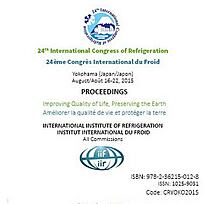
Summary
Sewage source heat pump (SSHP) systems recycle urban wastewater as a heat source, developing a renewable energy utilization pattern in the severe situation of global energy crisis and environmental pollution. Life cycle climate performance (LCCP), is the most comprehensive assessment method to calculate the cradle-to-grave warming impact in a quantitative form of the equivalent CO2 emission. To aid the research on the energy saving and emission reduction potential of SSHP, this paper focused on the energy comparison between SSHP and gas-fired and coal-fired boiler, and engineering data of typical cases in different cities of north China were tested. Accordingly LCCP model of SSHP was established to calculate the greenhouse gases that came from not only the unit but the heating system. Based on the results, indirect emission is dramatically higher than direct emission, and energy consumption especially played a key role. SSHP, substituting conventional heating ways, has remarkable benefits in ecology and economy. Besides, LCCP is supposed to be an index to evaluate refrigerant alternatives in view of the limitation of GWP.
Available documents
Format PDF
Pages: 7 p.
Available
Public price
20 €
Member price*
Free
* Best rate depending on membership category (see the detailed benefits of individual and corporate memberships).
Details
- Original title: Life cycle climate performance analysis of sewage source heat pump systems.
- Record ID : 30015841
- Languages: English
- Subject: Environment, General information
- Source: Proceedings of the 24th IIR International Congress of Refrigeration: Yokohama, Japan, August 16-22, 2015.
- Publication date: 2015/08/16
- DOI: http://dx.doi.org/10.18462/iir.icr.2015.0424
Links
See other articles from the proceedings (657)
See the conference proceedings
Indexing
-
Comparative analysis of life-cycle costs of geo...
- Author(s) : SHONDER J. A., MARTIN M. A., MCLAIN H. A., et al.
- Date : 2000/06/24
- Languages : English
- Source: ASHRAE Transactions. 2000 ASHRAE Annual Meeting, Minneapolis, Minnesota + CD-ROM.
View record
-
Uncertainty of life cycle climate performance (...
- Author(s) : MAKHNATCH P., KHODABANDEH R.
- Date : 2016/08/21
- Languages : English
- Source: 12th IIR Gustav Lorentzen Conference on Natural Refrigerants (GL2016). Proceedings. Édimbourg, United Kingdom, August 21st-24th 2016.
- Formats : PDF
View record
-
Hladenje i odrzivi razvoj.
- Author(s) : BILLIARD F.
- Date : 2002/12/04
- Languages : Serbian
- Source: Toplotna energija u sadasnjim ekonomskim i ekoloskim uslovima. 33. Kongres o klimatizaciji, grejanju, hladenju. Zbornik radova.
View record
-
Multi-criteria evaluation of river source heat ...
- Author(s) : JUNG Y., LEE H.
- Date : 2021/05/24
- Languages : English
- Source: 2021 Purdue Conferences. 6th International High Performance Buildings Conference at Purdue.
- Formats : PDF
View record
-
Survey of expected EU regulations referring to ...
- Author(s) : WINKLER J. A.
- Date : 1998/10/07
- Languages : English
- Source: Symposium '98. Refrigeration/air conditioning and regulations for environment protection: a ten years outlook for Europe.
View record
